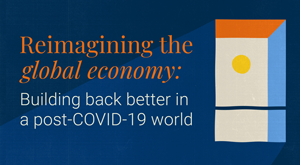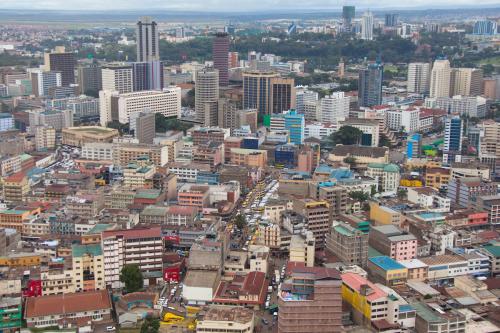This essay is part of “Reimagining the global economy: Building back better in a post-COVID-19 world,” a collection of 12 essays presenting new ideas to guide policies and shape debates in a post-COVID-19 world.
 The issue
The issue
The COVID-19 pandemic has struck at the heart of cities, with an estimated 90 percent of confirmed cases worldwide reported in urban areas 1. High rates of density, cultural and social gatherings, public transportation, the intermingling of diverse business and creative networks—many of the traits that define the uniqueness of cities are vulnerabilities when it comes to controlling transmission.
Mayors and local leaders form the front lines of COVID-19 response, protecting and restoring public health and economic security. In the first months of the crisis, they took decisive measures to develop safety protocols, supply medical requirements, and ensure health services, often stepping into a leadership void left by national governments. Globally, city-to-city cooperation and networks of cities provided a source of collaborative leadership, mutual support, and exchange of knowledge as the traditional multilateral system struggled to coordinate collective action.2
The crisis exposed deep underlying inequalities. Some growing cities with a prevalence of slums and informal settlements experienced rapid transmission; one study estimated that more than half of Mumbai slum dwellers contracted COVID-19.3 In high-income countries such as the U.S., frontline workers working in sectors essential to the health and continuity of the society earn lower wages4 and are more likely to be people of color, while data shows that Black people are dying at twice the rate of white people and represent more than four times more hospitalizations.5 They are also disproportionally impacted by the economic consequences of the crisis.6
The ideas
Protecting public health now—and advancing a green and just recovery
As the pandemic persists, city leaders are dual-tracking. They must continue to prioritize immediate measures to ensure public health and safety—from social distancing policies, to mechanisms for opening schools and other public institutions, to readying communication and pipelines for the dissemination of a forthcoming vaccine. Cities are innovating to “stop the bleeding,” finding ways to provide immediate support to the most vulnerable such as Bogota’s cash transfer initiative7 and Milan’s Mutual Aid Fund,8 partnerships that match city funds with private and other public sources.
At the same time, mayors sense an urgent need to address the existential crisis by committing to transformational recovery. They envision a rebuilt economy and society that will result in more inclusive, equitable, and sustainable cities. That starts with a focus on equity and reaching the most vulnerable first; at the same time, they see an imperative to accelerate action on climate change, and recognize a need to invest in infrastructure that support a green COVID-19 recovery. During the pandemic, Boston Mayor Marty Walsh pledged to make the city carbon-neutral by 2050.9 Cities such as Paris, Berlin, and Buenos Aires have accelerated the development of biking and pedestrian infrastructure in their city.
This demand by local leaders is reflected in multiple agendas and pledges created through global city-led networks since the start of the pandemic. Common themes of equity and sustainability run throughout the “Decalogue for the COVID-19 Aftermath”10 of the United Cities and Local Governments (UCLG); the “C40 Mayors Agenda for a Green and Just Recovery”11 of C40 Cities; the “Cities for a Resilient Recovery”12 coalition; and the Communiqué put forward by the Urban 20 (U20),13 with financing issues taken up by its “Special Working Group on Covid-19 and Future External Shocks.”
This collective political commitment by mayors may be starting to influence the global agenda. In his remarks on the release of a U.N. report on the urban characteristics of COVID-19, Secretary-General António Guterres recognized the importance of rebuilding in a way that results in more resilient, inclusive, and sustainable cities.14 Mayors and city networks have worked hard to position themselves as central to a successful and transformational recovery.
Mayors and local governments are pursuing new models of governance and citizen engagement that enable them to tackle structural challenges as they reopen the economy and city life.
Facing challenges to their vision
Yet mayors and city leaders face constraints that hinder their ability to act as the nexus of progress towards a green and just recovery. They quickly run into barriers regarding jurisdictional authorities. They are rarely involved in the design of fiscal stimulus and relief packages, and many are facing intense political pressure from their national governments and leaders. In the U.S., the Justice Department labeled several cities led by Democratic mayors as “anarchist jurisdictions.” Mayors across the globe are even experiencing threats to their personal safety.15
Faced with strong resource limits even before the pandemic began, cities have suffered massive losses in revenue, with many receiving significantly lower tax revenues and fees related to utilities and permitting amid the crisis. In the U.S. alone, cities face a potential budget shortfall of $360 billion over 2020-2022.16 Cities in the global south face additional constraints to action, including the size of the informal sector (80 percent of the urban economy in Africa).17 Before Mayor Aki-Sawyerr’s move to overhaul property taxes, the city council in Freetown received about 70 percent of its budget from foreign donors prior to the COVID-19 pandemic.18
Expanding governance to maintain political momentum
To maximize their influence and leadership nationally and globally, while maintaining political momentum at the local level, mayors and local leaders are innovating with governance and flexing their collective economic assets. This begins by leveraging the trust and legitimacy conferred by their constituents, which is often higher than state and national authorities. Polls consistently show that local government is more trusted than the federal or national government, with the largest gaps occurring in the U.S. (20 points), Japan (15 points), and France (11 points).19
To make the most of this confidence, mayors and local governments are pursuing new models of governance and citizen engagement that enable them to tackle structural challenges as they reopen the economy and city life. They are rethinking decisionmaking and policymaking models. Recognizing that their equity and sustainability objectives will require sustained political will, they are developing ways to create and manage alliances across the city ecosystem, to enable buy-in and investments from the private sector and promote meaningful engagement from residents and neighborhoods.
For example, the One-City governance model of Bristol is bringing together a wide range of local leaders on thematic boards that are shaping the city’s recovery policy. Cities are also experimenting with tools to involve citizens and the general public in decisionmaking. Mannheim undertook surveys and focus groups to develop its city strategy and priorities; New York City has “Sector Advisory Councils” comprised of representatives of civil society and the public and private sectors, to provide guidance on the city’s reopening and response to the COVID-19 crisis.
Influencing international policymaking and decisions
A growing movement of cities worldwide are localizing the Sustainable Development Goals (SDGs) framework to improve their policymaking and, in the post-COVID recovery, mainstream the principles of equity and sustainability into decisionmaking. Increasingly cities across the world are voluntarily reporting their local progress on the SDGs through Voluntary Local Reviews (VLRs). This movement takes its inspiration from Voluntary National Reviews (VNRs), which countries use to report on progress at the U.N. as part of the official follow-up on the SDGs.
As cities promote a green and just recovery, the SDGs are increasingly gaining attention from municipalities as a useful common language to connect diverse efforts around common goals and indicators. Cities are completing VLRS to provide accountability and transparency to the public. Given the promotion of the SDGs by Secretary-General Guterres as the framework for “building back better,” their adoption at the local level can give mayors and cities a foothold in the policymaking discourse of global recovery.
To build credibility for their agenda, cities are taking steps to collectively flex their own combined resources and assets.
The way forward
Seeking new financial arrangements. Even the largest and most economically powerful global cities enjoy limited economic independence from provincial and national governments. The public trust they have built and the support they are eliciting from multiple stakeholders and sectoral leaders provide a measure of political credibility for these mayors and local government officials to advocate for transformational recovery—yet the means to pay for it is not entirely under their control.
To build credibility for their agenda, cities are taking steps to collectively flex their own combined resources and assets. The mayors of 12 major cities have recently committed to divest their city’s assets from fossil fuel companies and increase their financial investments in climate solutions that promote decent jobs.20
The U20, a network of cities that seek to influence the G-20, announced plans to launch a “Global Urban Resilience Fund.” It is to be a fund created by cities, for cities, to enable direct international financing to municipalities (financing through multilateral development banks such as the World Bank Group must have the approval of the national government before flowing to local governments).
The success of cities to achieve a green and just recovery will depend upon financing from other levels of government as well as private sources. These efforts signal that mayors are willing to put their own skin in the game as they seek to influence public and private markets. No longer is it unusual for cities to band together and advocate with a collective political voice, but the extent to which they are successful in affecting global decisions remains limited. Collective actions such as these may give cities and their leaders the best chance to bend global policy decisions on the COVID-19 recovery towards their priorities—and achieve accelerated progress on sustainable development.
-
Acknowledgements and disclosures
The Brookings Institution is a nonprofit organization devoted to independent research and policy solutions. Its mission is to conduct high-quality, independent research and, based on that research, to provide innovative, practical recommendations for policymakers and the public. The conclusions and recommendations of any Brookings publication are solely those of its author(s), and do not reflect the views of the Institution, its management, its funders or its other scholars.
Brookings gratefully acknowledges the support of The Rockefeller Foundation.
Brookings recognizes that the value it provides is in its absolute commitment to quality, independence, and impact. Activities supported by its donors reflect this commitment.
-
Footnotes
- António Guterres, “COVID-19 in an Urban World,” United Nations, July 2020, https://www.un.org/sites/un2.un.org/files/sg_policy_brief_covid_urban_world_july_2020.pdf
- Anthony F. Pipa and Max Bouchet, “How to make the most of city diplomacy in the COVID-19 era,” Brookings Institution, August 6, 2020, brookings-edu-2023.go-vip.net/blog/up-front/2020/08/06/how-to-make-the-most-of-city-diplomacy-in-the-covid-19-era/
- Benjamin Parkin, “Over half of Mumbai slum dwellers have had Covid-19, study claims,” Financial Times, July 29, 2020, https://www.ft.com/content/5cfb2253-40ec-4ef3-9c1a-94b8a7bf2307
- Adie Tomer and Joseph W. Kane, “To protect frontline workers during and after COVID-19, we must define who they are,” Brookings Institution, June 10, 2020, https://www.brookings.edu/research/to-protect-frontline-workers-during-and-after-covid-19-we-must-define-who-they-are/
- “COVID-19 Hospitalization and Death by Race/Ethnicity,” Centers for Disease Control and Prevention, August 18, 2020, www.cdc.gov/coronavirus/2019-ncov/covid-data/investigations-discovery/hospitalization-death-by-race-ethnicity.html
- Bradley L. Hardy and Trevon D. Logan, “Racial Economic Inequality Amid the COVID-19 Crisis,” The Hamilton Project, August 2020, https://www.brookings.edu/wp-content/uploads/2020/08/EA_HardyLogan_LO_8.12.pdf
- “Summary of Measures to Mitigate the Effects of COVID-19,”Office of the Mayor of Bogotá, May 8, 2020, www.citiesforglobalhealth.org/sites/default/files/documents/2020-05/ENG Summary of Measures to Mitigate the Effects of COVID-19- May 8th %281%29_0.pdf.
- ”Milan – A new Fund for Mutual Aid,” Eurocities, March 23, 2020, https://covidnews.eurocities.eu/2020/03/23/milan-a-new-fund-for-mutual-aid/
- “Reducing Emissions,” City of Boston, Updated September 25, 2020, https://www.boston.gov/environment-and-energy/reducing-emissions
- “UCLG DECALOGUE for the COVID-19 aftermath,” United Cities and Local Governments, https://www.uclg.org/en/node/31076
- “C40 Mayors Agenda for a Green and Just Recovery,” C40 Cities, www.c40.org/other/agenda-for-a-green-and-just-recovery
- “Cities for a Resilient Recovery,” Resilient Cities Network, https://resilientcitiesnetwork.org/programs/cities-for-a-resilient-recovery/
- “Communiqué from the Urban 20 (U20),” U20, Octobver 2, 2020, www.urban20riyadh.org/sites/default/files/2020-10/U20 2020 Communique.pdf
- “Secretary-General Launches COVID-19 Policy Brief on Cities to Help Urban Areas Build Back Better, Address Inequalities,” United Nations, July 28, 2020, www.un.org/press/en/2020/sgsm20189.doc.htm
- Emma Beswick, “French local mayors facing wave of violence, says association,” euronews, August 31, 2020, www.euronews.com/2020/08/31/french-local-mayors-facing-wave-of-violence-says-association
- “What COVID-19 means for cities finances,” National League of Cities, June 2020, https://covid19.nlc.org/wp-content/uploads/2020/06/What-Covid-19-Means-For-City-Finances_Report-Final.pdf
- Patrick Brandful Cobbinah Ellis Adjei Adams, and Michael Odei Erdiaw-Kwasie, “Can COVID-19 inspire a new way of planning African cities?” The Conversation, September 20, 2020, https://theconversation.com/can-covid-19-inspire-a-new-way-of-planning-african-cities-145933
- “A mayor is reforming Sierra Leone’s rotten property tax,” The Economist, June 18, 2020, www.economist.com/middle-east-and-africa/2020/06/18/a-mayor-is-reforming-sierra-leones-rotten-property-tax
- “Government trust surges to an all-time high amid COVID-19 pandemic making it the most trusted institution,” Edelman, May 5, 2020, https://www.edelman.com/news/trust-2020-spring-update-press-release
- “Mayors of 12 Major Cities Commit to Divest From Fossil Fuel Companies, Invest in Green and Just Recovery from COVID-19 Crisis,” C40 Cities, September 22, 2020, www.c40.org/press_releases/cities-commit-divest-invest







